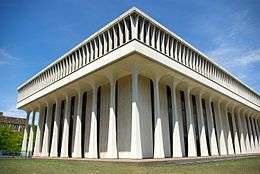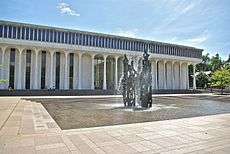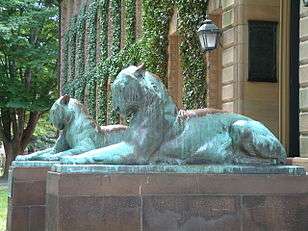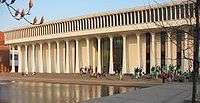Princeton School of Public and International Affairs
The Princeton School of Public and International Affairs (formerly the Woodrow Wilson School of Public and International Affairs) is a professional public policy school at Princeton University. The school provides an array of comprehensive coursework in the fields of international development, foreign policy, science and technology, and economics and finance through its undergraduate (AB) degrees, graduate Master of Public Affairs (MPA), Master of Public Policy (MPP), and PhD degrees. Since 2012, Cecilia Rouse has been dean of the Princeton School. The school is consistently ranked as one of the best institutions for the study of international relations and public affairs in the country and in the world.[1] Foreign Policy ranks the Princeton School as No. 2 in the world for International Relations at the undergraduate and PhD levels, behind the Harvard Kennedy School.[2]
 Robertson Hall, home to the Princeton School of Public and International Affairs | |
| Type | Private |
|---|---|
| Established | 1930 |
Parent institution | Princeton University |
| Affiliation | APSIA |
| Dean | Cecilia Rouse |
Academic staff | 85 full-time faculty members and approximately 45 visiting professors, lecturers, and practitioners |
| Students | Approximately 300 undergraduate students and approximately 190 graduate students |
| Location | , , United States |
| Website | wws.princeton.edu |
History
In 1930, Princeton University established the School of Public and International Affairs, which was originally meant to serve as an interdisciplinary program for undergraduate students in Princeton's liberal arts college. In 1948, the School added a graduate professional program and was renamed to honor Woodrow Wilson,[3] who was the 13th president of the University, governor of New Jersey and the 28th president of the United States. In two of Wilson's speeches at the University – first during its 150th anniversary celebration in 1896 and again at his inauguration as the University's president in 1902 – he mentioned “Princeton in the nation’s service.”[4] This phrase serves as the basis for the University's unofficial motto, which was amended in 2016 to "Princeton in the nation's service and in the service of humanity."[5]
In 2015, student protesters forced Princeton to reconsider having the School named after Wilson due to his racist views, of which they disapproved. The Wilson Legacy Review Committee ultimately decided to keep his name attached to the School, noting that, like many other notable figures from American history, Wilson had a "complex legacy of both positive and negative repercussions".[6][7]
On June 26, 2020, following the eruption of George Floyd protests and the resurgence of the Black Lives Matter movement, the Princeton University Board of Trustees decided to rename the Woodrow Wilson School the "Princeton School of Public and International Affairs", citing Wilson's "racist thinking and policies [that] make him an inappropriate namesake for a school or college whose scholars, students, and alumni must stand firmly against racism in all its forms."[8][9][10][11] It was also announced that Wilson College, the first of Princeton's six undergraduate residential colleges, will be renamed First College. Woodrow Wilson opposed admitting African-American students to Princeton, and introduced racial segregation into the United States federal civil service as President.[12]
Academics
Undergraduate program
The school stresses a multidisciplinary approach to policy studies, which includes a focus on politics, economics, sociology, psychology, molecular biology, geosciences, and health. Undergraduate students at the Wilson School take courses in at least four disciplines including economics, history, politics, psychology, sociology, and science.[13] In their junior year, students must enroll in and complete a Policy Task Force, which addresses a specific public policy issue. Students conduct research, propose recommendations, and issue final reports.[14] Students are also allowed to work towards certificates in an array of fields, including Global Health and Health Policy, Urban Studies, and the History and the Practice of Diplomacy.
Master's degrees
The two-year MPA program prepares students for international and domestic policy careers. All second-year MPA students must complete a Policy Workshop, which emphasizes policy implementation. Through the graduate policy workshops, students conduct field-based research and present their research and recommendations to clients. Students also develop analytical and quantitative skills through coursework emphasizing the political, economic, and behavioral aspects of complex policy issues. MPA candidates may select one of four fields of concentration:
- International Relations
- International Development
- Domestic Policy
- Economics and Public Policy
The one-year MPP program is designed for mid-career professionals, PhD research scientists, lawyers, and physicians who are involved in international and domestic public policy.
Doctoral degrees
The PhD in Public Affairs focuses on two research areas: security studies; and science, technology and environmental policy. The School works with other departments at the University to offer a Joint Degree Program that combines work in a social science with a multidisciplinary perspective on economics problems.[15] Graduate students also have the opportunity to pursue certificates in demography; health and health policy; science, technology and environmental policy; and urban policy/urban policy and planning.[16] In addition to the MPA, MPP and PhD degrees,[17] the School offers a four-year MPA/J.D. program, and has formal joint degree arrangements with law schools at Columbia University,[18] New York University[19] and Stanford University.[20] Students often refer to the school by its colloquial abbreviation, "Woody Woo". The school also offers a Joint Degree Program (JDP) in Social Policy, allowing students to take courses in the departments of politics, psychology, sociology, and economics.
Robertson Hall

In 1961, Charles ’26 and Marie Robertson provided a gift to expand the graduate school. Their gift funded the construction of the School’s current home, designed by Minoru Yamasaki, who also designed New York's original World Trade Center.[21] To the north of the building is James FitzGerald's Fountain of Freedom (1966).[22]
In 2012,[23] the Princeton University Art Museum announced the installation of the “Circle of Animals/Zodiac Heads” exhibit by Chinese artist Ai Weiwei[24] on Scudder Plaza.
Centers and programs
The Princeton School has 19 unique centers and programs:[25]
- Bendheim-Thoman Center for Research on Child Wellbeing (CRCW)
- Center for Arts and Cultural Policy Studies (CACPS)
- Center for Health and Wellbeing (CHW)
- Center for Information Technology Policy (CITP)
- Center for International Security Studies (CISS)
- Center for the Study of Democratic Politics (CSDP)
- China and the World Program (CWP)
- Education Research Section (ERS)
- Innovations for Successful Societies (Institutions for Fragile States)
- Julis-Rabinowitz Center for Public Policy and Finance (JRC)
- Liechtenstein Institute on Self-Determination (LISD)
- Niehaus Center for Globalization and Governance (NCGG)
- Office of Population Research (OPR)
- Princeton Survey Research Center (SRC)
- Program in Law and Public Affairs (LAPA)
- Program in Science, Technology, and Environmental Policy (STEP)
- Program on Science and Global Security (SGS)
- Research Program in Development Studies (RPDS)
- Research Program in Political Economy (RPPE)
PolicyNet is a network of prominent public policy schools around the world, founded in 2005 as a joint venture between the Woodrow Wilson School of Public and International Affairs and the Centre for International Governance Innovation for interaction and collaboration on issues of common interest, curricular programs, joint research projects and other activities.
The school is a full member of the Association of Professional Schools of International Affairs (APSIA), a group of schools of public policy, public administration, and international studies.
Notable alumni
- Bob Abernethy, television journalist
- Steve Adler, Mayor of Austin, TX
- Samuel Alito, Associate Justice of the Supreme Court of the United States
- Janmejaya Sinha, Chairman, Asia-Pacific, Boston Consulting Group
- Nicholas Allard, Dean and President of Brooklyn Law School
- Hady Amr, deputy assistant administrator, Bureau for the Middle East, U.S. Agency for International Development, former director, Brookings Doha Center, Brookings Institution
- Jeremy Ben-Ami, former domestic policy adviser to President Bill Clinton and President of the Pro-Israel, Pro-Peace lobby, J Street
- Joshua B. Bolten, former White House Chief of Staff; former director of the Office of Management and Budget under George W. Bush
- Kit Bond, former U.S. Senator from Missouri, former Governor of Missouri
- Brendan Byrne, former Governor of New Jersey
- Simon Carcagno, professional rower for the U.S. National team
- Frank Carlucci, former Secretary of Defense
- Barbara Cassani, founder of Go Fly and leader of London's successful bid for the 2012 Summer Olympics
- Steven Colloton, judge of the United States Court of Appeals for the Eighth Circuit
- Edward F. Cox, lawyer
- Ted Cruz, U.S. Senator from Texas, former Solicitor General of Texas
- Mitch Daniels, former Governor of Indiana, former director of the Office of Management and Budget under George W. Bush
- Joseph Fichera, founder and CEO of Saber Partners, auction rate securities expert.
- Bill Frist, former U.S. Senator from Tennessee, former Senate Majority Leader
- Nellie Gorbea, Secretary of State of Rhode Island
- Robert L. Gordon III, former U.S. Deputy Under Secretary of Defense for Military Community and Family Policy
- Mohsin Hamid, author of The Reluctant Fundamentalist
- Michael Huerta, Administrator of the Federal Aviation Administration, former Managing Director of the 2002 Winter Olympics held in Salt Lake City, Utah
- Timothy Hwang, founder and CEO of FiscalNote
- James A. Johnson, former chairman of Fannie Mae and Democratic "wise man"
- Nicholas Katzenbach, former United States Attorney General
- Wendy Kopp, founder of Teach for America
- Pedro Pablo Kuczynski, former President of Peru
- Anthony Lake, executive director of UNICEF, former National Security Advisor (1993–1997)
- Leonard Lance, U.S. Representative for New Jersey's 7th District
- David J. Lane, U.S. Ambassador and former philanthropy executive
- William Lynn, former U.S. Deputy Secretary of Defense
- David McCormick, former Under Secretary of the Treasury for International Affairs
- Mike McCurry, former White House Press Secretary under Bill Clinton
- Jeff Merkley, U.S. Senator from Oregon, former Speaker of the Oregon House of Representatives
- Judith Miller, former reporter for The New York Times, covered the Plame affair
- Ralph Nader, consumer protection lawyer, author and political activist
- Joseph S. Nye, Jr., former dean of the John F. Kennedy School of Government at Harvard University
- Michael E. O'Hanlon, senior fellow at The Brookings Institution
- Robert C. Orr, United Nations Assistant Secretary-General for Policy Coordination and Strategic Planning
- David H. Petraeus, United States Army General Commander, International Security Assistance Force (ISAF) and Commander, U.S. Forces Afghanistan (USFOR-A), and former director of the Central Intelligence Agency
- Stuart J. Rabner, Chief Justice of the New Jersey Supreme Court
- Asha Rangappa, director of admissions and a senior lecturer at Yale University's Jackson Institute for Global Affairs
- Chuck Reed, mayor of San Jose, California
- Chip Reid, national correspondent, CBS News
- Graham Richard, mayor of Fort Wayne, Indiana
- Anthony Romero, executive director of the American Civil Liberties Union
- William Rusher, publisher, National Review
- John P. Sarbanes, U.S. Representative for Maryland's 3rd District
- Paul Sarbanes, former U.S. Senator from Maryland
- Michael H. Schill, President of the University of Oregon, and former Dean of UCLA School of Law and the University of Chicago Law School
- Terri A. Sewell, U.S. Representative for Alabama's 7th District
- George P. Shultz, former Secretary of State, former Secretary of the Treasury, former Secretary of Labor
- P. W. Singer, senior fellow, director, 21st Century Defense Initiative, Brookings Institution
- Anne-Marie Slaughter, former Director of Policy Planning, United States Department of State, former Dean of the Woodrow Wilson School
- Bob Taft, former Governor of Ohio
- John Turitzin, vice-president, Marvel Entertainment
- Paul Volcker, former Chairman of the Federal Reserve
- Brady Walkinshaw, state legislator in Washington
Faculty
Nearly all full-time Princeton School faculty members have dual appointments with other departments at the university. The school also has visiting professors, lecturers, and practitioners from the world of public and international affairs that teach. Faculty members at the School include Nobel Laureates, Pulitzer Prize winners, and former ambassadors.[26] Nobel Laureates include Angus Deaton, Daniel Kahneman, Paul Krugman, and Arthur Lewis.
References
- "International Affairs Grad School Guide" (PDF). Foreign Policy Association.
- "The Best International Relations Schools in the World". Foreign Policy.
- "Princeton Timeline".
- "Princeton in the Nation's Service".
- "Our History".
- Hannon, Elliot (April 4, 2016). "Princeton Decides to Keep Woodrow Wilson's Name on Campus Buildings Despite Racist Past". Slate.
- Markovich, Alexandra (April 4, 2016). "Princeton Board Votes to Keep Woodrow Wilson's Name on Campus Buildings". New York Times.
- "U. renames Woodrow Wilson School and Wilson College". The Princetonian. Retrieved 2020-06-27.
- "President Eisgruber's message to community on removal of Woodrow Wilson name from public policy school and Wilson College". Princeton University. Retrieved 2020-06-27.
- "Board of Trustees' decision on removing Woodrow Wilson's name from public policy school and residential college". Princeton University. Retrieved 2020-06-27.
- Pietsch, Bryan (2020-06-27). "Princeton Will Remove Woodrow Wilson's Name From School". The New York Times. ISSN 0362-4331. Retrieved 2020-06-27.
- Princeton To Remove Woodrow Wilson's Name From Public Policy School
- "Undergraduate Academics".
- "Policy Task Forces".
- "Graduate Academics".
- "Programs".
- "Joint MPA/JD".
- "Joint Degree Programs". Columbia Law School.
- "Dual Degree with Woodrow Wilson School of Public and International Affairs at Princeton University". NYU Law.
- "Overview of Joint Degree and Cooperative Programs". Stanford Law School.
- Zielenziger, David. "Miss The World Trade Center? Princeton's Robertson Hall Remains Reminder". International Business Times.
- "Fountain of Freedom". Campus Art at Princeton. Princeton Art Museum. Retrieved 11 August 2016.
- "Welcome to Ai Weiwei at Princeton". princeton.edu.
- "Ai Weiwei - Circle of Animals / Zodiac Heads".
- "Centers and Programs".
- "Faculty & Research". wws.princeton.edu.

